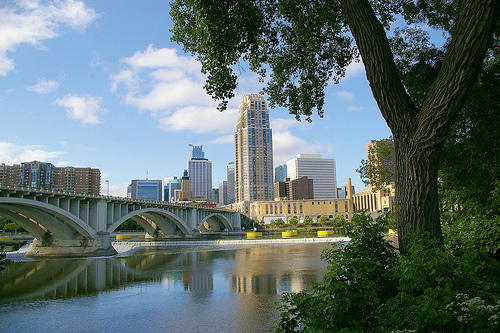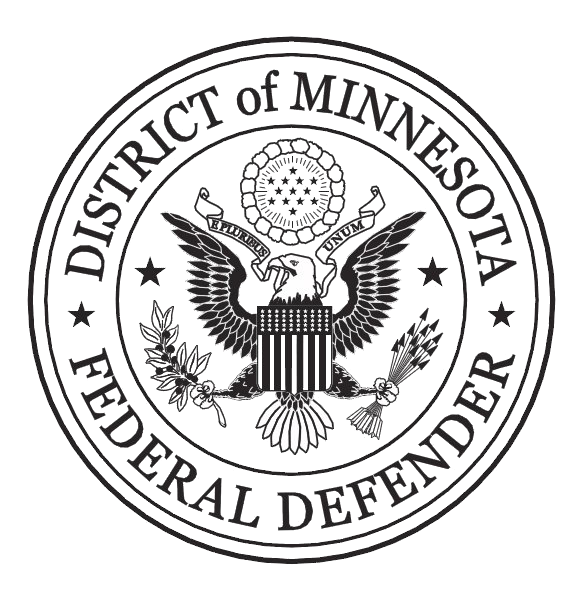Office of the Federal Defender
District of Minnesota
_________________________________________________________________________________________________________________________________
Copyright © 2025
Federal Defenders Office - District of Minnesota
Copyright © 2025
Federal Defenders Office - District of Minnesota

DISCOVERY AND INVESTIGATION
PREPARING YOUR CASE: There are two main ways that you and your attorney get the information you need to defend your case: discovery and investigation.
WHAT IS DISCOVERY? “Discovery” is the word used to describe evidence against you that the prosecutor must give to your attorney. The discovery process provides your attorney with the opportunity to see some of the evidence that the prosecutor will use against you and also to determine if any of the information may be helpful to defend you.
WHAT TYPE OF DISCOVERY DOES THE PROSECUTOR HAVE TO GIVE MY ATTORNEY? The government has to give your attorney copies of any documents that they plan to use against you at trial, or that are important to the preparation of your defense; any scientific test results; and any statements you made to law enforcement. Your attorney also has the right to look at any physical evidence (gun, drugs, computer printouts etc.) that the government plans to use against you.
WHEN DO WE GET DISCOVERY? One of the first things your attorney will do after you have been charged is make a written demand to the prosecutor (called a motion) for discovery. Then your attorney, and maybe an investigator, will review that discovery with you. The discovery will give you and your attorney an idea about the strength of the case against you. Decisions about what motions to bring, what investigation needs to be done, and whether or not to try for a plea bargain, often depend on what’s in the discovery.
DEFENSE INVESTIGATION: Your attorney will explore whether you have any possible defenses to the charges. They will also explore other issues that could affect your case. In some cases, but not all, this requires investigation.
Your attorney will determine whether your case needs investigation, because not every case does. Investigation varies widely from case to case, and can include locating and interviewing witnesses, examining scenes, having physical evidence tested, organizing documents, getting expert opinions, etc.
If investigation is needed, your attorney will assign an investigator to do this work. The investigator will become part of your legal team and may visit you to discuss your case. Anything you say to your investigator is completely confidential. They are covered by the same rules of confidentiality as your attorney. Please cooperate with your investigator so they can do the best job possible in defending you.
DO WE HAVE TO GIVE DISCOVERY TO THE PROSECUTOR? ANYTHING YOU TELL YOUR ATTORNEY, INVESTIGATOR OR OTHER FEDERAL DEFENDER EMPLOYEE IS PRVILEGED, AND WILL NEVER BE DISCLOSED TO THE PROSECUTOR OR ANYONE ELSE. The exception to this is if you and your attorney decide to disclose something you have said.
If your case goes to trial, your attorney will have to show the prosecutor any evidence you will use in your case, and any scientific test results that will be used at trial. During the investigation of your case, your legal team will take care to protect all information you give them. Your attorney will explain to you as your case proceeds, which information has to be shared with the prosecutor.
WHY WON’T MY ATTORNEY GIVE ME COPIES OF MY DISCOVERY? There are two possible explanations for this: 1) If the Court has issued a Protective Order, your attorney is permitted to review the discovery documents with you but prohibited from giving you copies and/or 2) Sometimes the government provides your attorney with more discovery than is required by the rules, but does so with the restriction that copies of the documents not be provided to you (the defendant). Although this puts your attorney in a difficult position, it is so important that they know what evidence the government has against you that sometimes your attorney must agree to these terms. Otherwise they simply have no right to see this additional discovery.
WHAT IS DISCOVERY? “Discovery” is the word used to describe evidence against you that the prosecutor must give to your attorney. The discovery process provides your attorney with the opportunity to see some of the evidence that the prosecutor will use against you and also to determine if any of the information may be helpful to defend you.
WHAT TYPE OF DISCOVERY DOES THE PROSECUTOR HAVE TO GIVE MY ATTORNEY? The government has to give your attorney copies of any documents that they plan to use against you at trial, or that are important to the preparation of your defense; any scientific test results; and any statements you made to law enforcement. Your attorney also has the right to look at any physical evidence (gun, drugs, computer printouts etc.) that the government plans to use against you.
WHEN DO WE GET DISCOVERY? One of the first things your attorney will do after you have been charged is make a written demand to the prosecutor (called a motion) for discovery. Then your attorney, and maybe an investigator, will review that discovery with you. The discovery will give you and your attorney an idea about the strength of the case against you. Decisions about what motions to bring, what investigation needs to be done, and whether or not to try for a plea bargain, often depend on what’s in the discovery.
DEFENSE INVESTIGATION: Your attorney will explore whether you have any possible defenses to the charges. They will also explore other issues that could affect your case. In some cases, but not all, this requires investigation.
Your attorney will determine whether your case needs investigation, because not every case does. Investigation varies widely from case to case, and can include locating and interviewing witnesses, examining scenes, having physical evidence tested, organizing documents, getting expert opinions, etc.
If investigation is needed, your attorney will assign an investigator to do this work. The investigator will become part of your legal team and may visit you to discuss your case. Anything you say to your investigator is completely confidential. They are covered by the same rules of confidentiality as your attorney. Please cooperate with your investigator so they can do the best job possible in defending you.
DO WE HAVE TO GIVE DISCOVERY TO THE PROSECUTOR? ANYTHING YOU TELL YOUR ATTORNEY, INVESTIGATOR OR OTHER FEDERAL DEFENDER EMPLOYEE IS PRVILEGED, AND WILL NEVER BE DISCLOSED TO THE PROSECUTOR OR ANYONE ELSE. The exception to this is if you and your attorney decide to disclose something you have said.
If your case goes to trial, your attorney will have to show the prosecutor any evidence you will use in your case, and any scientific test results that will be used at trial. During the investigation of your case, your legal team will take care to protect all information you give them. Your attorney will explain to you as your case proceeds, which information has to be shared with the prosecutor.
WHY WON’T MY ATTORNEY GIVE ME COPIES OF MY DISCOVERY? There are two possible explanations for this: 1) If the Court has issued a Protective Order, your attorney is permitted to review the discovery documents with you but prohibited from giving you copies and/or 2) Sometimes the government provides your attorney with more discovery than is required by the rules, but does so with the restriction that copies of the documents not be provided to you (the defendant). Although this puts your attorney in a difficult position, it is so important that they know what evidence the government has against you that sometimes your attorney must agree to these terms. Otherwise they simply have no right to see this additional discovery.

107 U.S. Courthouse
300 South Fourth St.
Minneapolis, MN 55415
612-664-5858 - Phone
612-664-5850 - FAX
300 South Fourth St.
Minneapolis, MN 55415
612-664-5858 - Phone
612-664-5850 - FAX